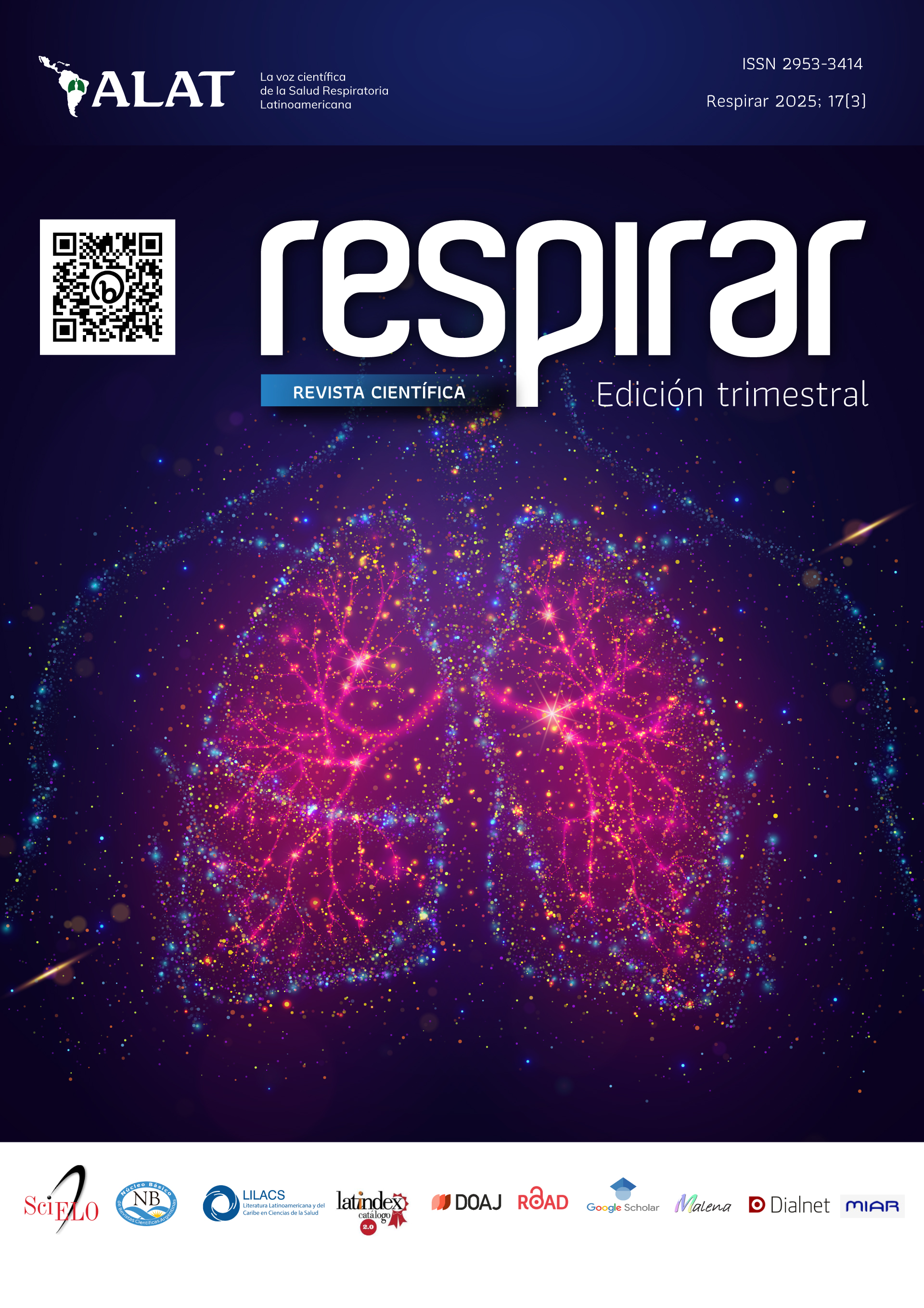New Era in the Management of Early-Stage Lung Adenocarcinoma: a 3-Year Observational Follow-Up Study
Main Article Content
Abstract
Background: Lung cancer is frequently diagnosed in advanced stages and is currently the leading cause of cancer-related mortality worldwide. A multidisciplinary approach is crucial to optimize diagnosis, treatment and improve patient survival.
Methods: A retrospective cohort analytical study over two time periods, including patients over 18 years old with early-stage lung adenocarcinoma treated at a high-complexity oncology center in Colombia. The exposure group (2021-2023) received multidisciplinary care, while the non-exposure group (2018-2020) was managed conventionally by individual specialists. The study aimed to compare clinical outcomes and treatment times between both groups. Statistical analysis was based on the distribution of variables.
Results: A total of 34 patients were included. The multidisciplinary approach enabled earlier diagnosis of lung adenocarcinoma, increasing early-stage identification from 30% to 61% between 2018 and 2022. Additionally, the multidisciplinary group had a higher proportion of asymptomatic cases (54% vs. 32%) and a lower relapse rate (7% vs. 52%) compared to conventional management. Treatment initiation times were significantly reduced from 3.2 to 2.2 months (p < 0.05), and the time from pathology to treatment decreased to 30 days in the multidisciplinary group versus 85 days in the conventional group.
Conclusions: The multidisciplinary approach reduced waiting times for the initiation of cancer treatment, increased treatment adherence and improved clinical outcomes.
Downloads
Article Details
Section

This work is licensed under a Creative Commons Attribution 4.0 International License.
How to Cite
References
Kuhn E, Morbini P, Cancellieri A, Damiani S, Cavazza A, Comin CE. Adenocarcinoma classification: patterns and prognosis. Pathologica 2018; 110(1):5-11.
Jones GS, Baldwin DR. Recent advances in the management of lung cancer. Clin Med (Lond) 2018;18(Suppl 2):s41-s46. Doi: 10.7861/clinmedicine.18-2-s41.
Rudin CM, Brambilla E, Faivre-Finn C, Sage J. Small-cell lung cancer. Nat Rev Dis Primers 2021; 7(1):3. Doi: 10.1038/s41572-020-00235-0.
Candal-Pedreira C, Ruano-Ravina A, Calvo de Juan V et al. Analysis of Diagnostic Delay and its Impact on Lung Cancer Survival: Results From the Spanish Thoracic Tumor Registry. Arch Bronconeumol 2024; 60 (2):S38-S45. Doi: 10.1016/j.arbres.2024.07.006.
Callejas Gutiérrez AM. Cáncer de pulmón, ¿cuál es la mejor estrategia para cambiar los desenlaces? Rev Colomb Cancerol 2023;27(1):76–79. Doi: https://doi.org/10.35509/01239015.964.
Haward RA. The Calman-Hine report: a personal retrospective on the UK's first comprehensive policy on cancer services. Lancet Oncol 2006;7(4):336-46. Doi: 10.1016/S1470-2045(06)70659-3.
Stone CJL, Vaid HM, Selvam R, Ashworth A, Robinson A, Digby GC. Multidisciplinary Clinics in Lung Cancer Care: A Systematic Review. Clin Lung Cancer 2018;19(4):323-330.e3. Doi: 10.1016/j.cllc.2018.02.001.
Riedel RF, Wang X, McCormack M et al. Impact of a multidisciplinary thoracic oncology clinic on the timeliness of care. J Thorac Oncol 2006; 1(7):692-6.
Peckham J, Mott-Coles S. Interprofessional Lung Cancer Tumor Board: The Role of the Oncology Nurse Navigator in Improving Adherence to National Guidelines and Streamlining Patient Care. Clin J Oncol Nurs 2018; 22(6):656-662. Doi: 10.1188/18.CJON.656-662.
de Castro GJr, Souza FH, Lima J, Bernardi LP, Teixeira CHA, Prado GF; Grupo Brasileiro de Oncologia Torácica (GBOT). Does Multidisciplinary Team Management Improve Clinical Outcomes in NSCLC? A Systematic Review With Meta-Analysis. JTO Clin Res Rep 2023;4(12):100580. Doi: 10.1016/j.jtocrr.2023.100580.
Fleissig A, Jenkins V, Catt S, Fallowfield L. Multidisciplinary teams in cancer care: are they effective in the UK? Lancet Oncol 2006;7(11):935-43. Doi: 10.1016/S1470-2045(06)70940-8.
Bisceglia I, Marinelli F, Morabito F, Neri A, Mangone L. Multidisciplinary approach in oncology: enhancing patient outcomes through collaborative care. Ann Research Oncol 2024;4(2), 3-18, 2024. Doi: 10.48286/aro.2024.86.
Hung HY, Tseng YH, Chao HS et al. Multidisciplinary team discussion results in survival benefit for patients with stage III non-small-cell lung cancer. PLoS One 2020;15(10):e0236503. Doi: 10.1371/journal.pone.0236503.
Pan CC, Kung PT, Wang YH, Chang YC, Wang ST, Tsai WC. Effects of multidisciplinary team care on the survival of patients with different stages of non-small cell lung cancer: a national cohort study. PLoS One 2015; 10(5):e0126547. Doi: 10.1371/journal.pone.0126547.
Tsai CH, Hsieh HF, Lai TW, Kung PT, Kuo WY, Tsai WC. Effect of multidisciplinary team care on the risk of recurrence in breast cancer patients: A national matched cohort study. Breast 2020; 53:68-76. Doi: 10.1016/j.breast.2020.07.001.
